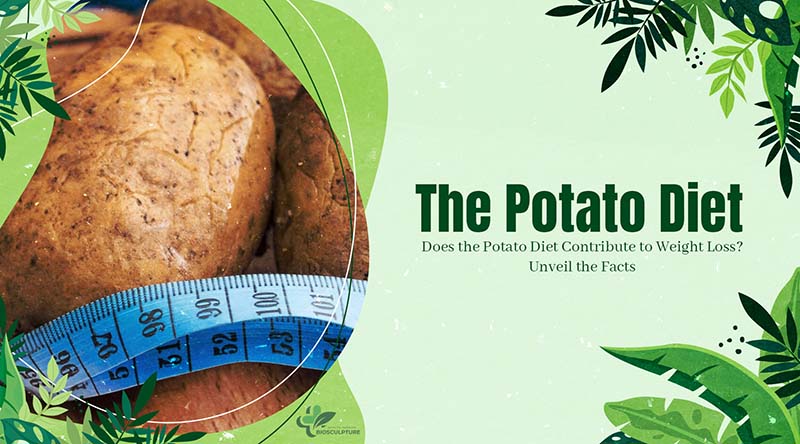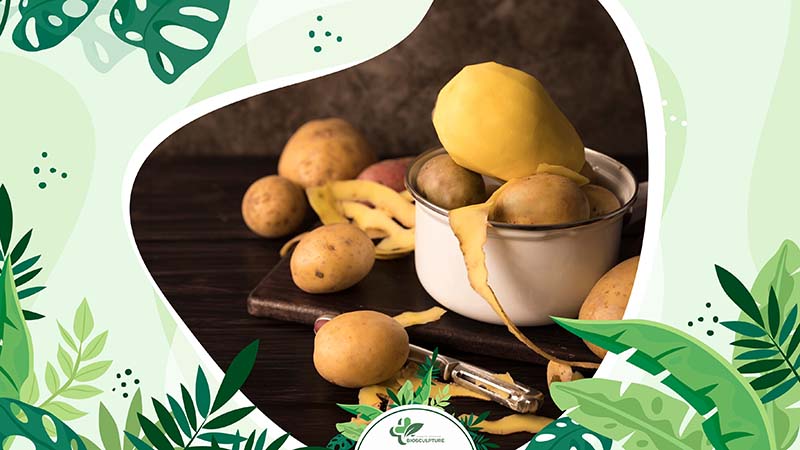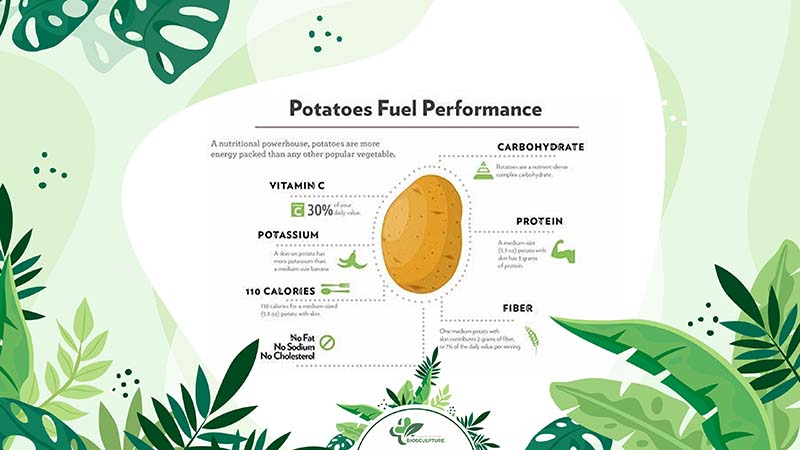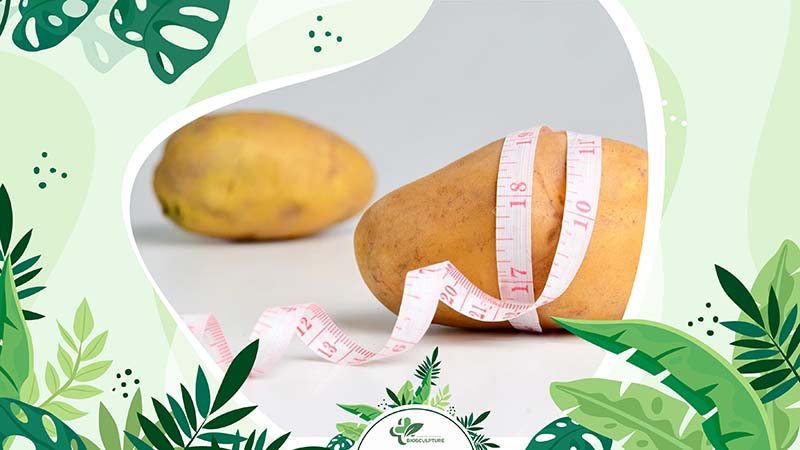In our fast-paced world, many people are turning to crash diets for quick results. The potato diet is one trend that’s catching on. The concept is straightforward: stick to eating just potatoes for anywhere between three to five days, though some might push it to a week or more, depending on what they’re aiming to achieve. Let’s explore the article below with Biosculpture.

1. What Is the Potato Diet?
The potato diet traces its origins back to 1849 but regained popularity thanks to Tim Steele, author of “Potato Hack: Weight Loss Simplified,” published in 2016.
Steele touts potatoes as the “ultimate diet pill,” claiming they bolster the immune system, enhance gut health, and offer ample nutrients to sustain energy levels during potato diet weight loss.
Some individuals have taken the diet to extreme levels, further fueling its popularity. One notable example is Penn Jillette, a magician who documented his experience in “Presto! How I Made Over 100 Pounds Disappear.” Jillette’s regimen consisted solely of plain potatoes for the initial two weeks, resulting in an 18-pound (8 kg) weight loss.
Despite anecdotal reports of significant weight loss, there is a lack of scientific studies backing up these assertions.

2. Advantages of the Potato Diet for Weight Loss
While the potato diet may face criticism, it does offer some potential advantages:
- Nutritional Richness: Potatoes pack a punch when it comes to essential vitamins and minerals like vitamin C, potassium, folate, and iron.
- Simplicity: Despite its restrictiveness, the potato diet is straightforward. Just stick to plain potatoes for 3–5 days.
- Affordability: Potatoes are among the most budget-friendly fresh produce options, making this diet an economical choice.
- High Fiber Content: Research indicates that diets high in fiber promote gut health and may aid in preventing conditions like obesity, heart disease, and type 2 diabetes.
However, it’s important to note that potatoes alone cannot provide all the nutrients your body needs. A well-balanced diet that incorporates a variety of fruits, vegetables, whole grains, healthy fats, and lean proteins is crucial for overall health and sustainable weight loss.

3. Disadvantages of the Potato Diet
Relying solely on potatoes for sustenance comes with notable drawbacks:
3.1 Extreme Restriction
- The potato diet ranks among the most restrictive diets, making it challenging to adhere to. Such strictness can foster an unhealthy relationship with food, potentially leading to disordered eating patterns like binge eating.
- Moreover, the diet often encourages additional restrictive behaviors such as meal skipping and fasting, which are unnecessary given its already low calorie nature. Embracing hunger as suggested by some proponents may exacerbate these issues.
3.2 Lack of Essential Nutrients
- While potatoes offer certain vitamins and minerals like potassium, vitamin C, and iron, they fall short in providing crucial nutrients like protein and fat. A medium-sized potato contains minimal protein and virtually no fat.
- Additionally, potatoes lack several other vital nutrients including calcium, vitamin A, and certain B vitamins. While short-term adherence to the diet may not result in immediate nutrient deficiencies, prolonged or frequent use could pose risks.
3.3 Potential for Muscle Loss
- Rapid weight loss associated with fad diets like the potato diet often entails muscle loss alongside fat reduction, especially with severe calorie restriction. Research indicates that a significant portion of weight lost on very low calorie diets is from lean body mass.
- Unlike diets with higher protein content, the potato diet lacks sufficient protein to mitigate muscle loss during calorie restriction.
3.4 Risk of Unintended Weight Gain
- Very low calorie diets like the potato diet may prompt metabolic adaptation, wherein the body slows its metabolism and burns fewer calories in response to reduced energy intake. This phenomenon, known as “adaptive thermogenesis,” can persist long after discontinuing the diet.
- Studies suggest that this metabolic slowdown may contribute to difficulty in maintaining weight loss over time, with many individuals eventually regaining lost weight—a phenomenon observed in over 80% of dieters.
4. Foods to Include in the Potato Diet
Unless following a more lenient variation like the Spud Fit Challenge, the potato diet primarily allows consumption of plain white potatoes. Here are some options you may consider:
- Baked potatoes
- Boiled potatoes
- Steamed potatoes
- Raw potatoes
- Oven-baked, oil-free hash browns
- Oven-baked, oil-free home fries
- Oven-baked, oil-free French fries
On the most basic version of the diet, salt is the only permitted seasoning. However, some variations may allow the use of spices and fat-free condiments.
For mashed potatoes, some individuals use chicken or vegetable broth, while others prefer to mash the potatoes plain.
As for beverages, it’s recommended to stick with water, plain tea, and black coffee.
5. Foods to Avoid While on the Potato Diet
The potato diet imposes strict restrictions, limiting consumption solely to potatoes. Here’s what to steer clear of:
- Any foods besides potatoes are off-limits.
- Avoid varieties like sweet potatoes and yams, as they’re not permitted.
- Say no to potatoes fried in oil or heavily processed. This encompasses traditional favorites such as:
- French fries
- Tater tots
- Potato chips
6. How to Prepare for the Potato Diet & Tips for Success
Preparing for the potato diet involves understanding its structure and incorporating strategies for success:
- Meal Schedule: There’s no rigid meal schedule on the potato diet. Followers can eat until they feel satisfied, including main meals like breakfast, lunch, dinner, and snacks. Typically, the diet is intended for short-term use, lasting two to five consecutive days, although some may extend it up to a week.
- Cooking Methods: How you prepare your potatoes matters. Avoid methods that require added fat, such as frying. Instead, opt for cooking techniques like boiling, steaming, baking, or roasting, which don’t rely on additional fats.
- Portion Control: The amount of potatoes consumed daily varies among individuals. Most versions of the diet advise eating until fullness, typically averaging around two to five pounds of potatoes per day. It’s crucial to ensure an adequate calorie intake to avoid nutrient deficiencies due to the diet’s restrictive nature.
- Balanced Approach: Enhance the potato diet’s balance and sustainability by incorporating whole plant-based foods like fruits, vegetables, grains, and legumes. These foods offer protein, fiber, vitamins, and minerals while being naturally low in fat.
- Healthy Fats: Although the potato diet discourages dietary fat in the short term, it’s essential for a well-rounded diet. Consider integrating healthy fats from sources like nuts, seeds, and avocado if you plan to adopt a potato-inspired diet in the long term.
- Cost Considerations: The potato diet is budget-friendly, given the affordability of potatoes. Conventionally grown potatoes are particularly cost-effective compared to organic varieties. While organic options are available for those concerned about pesticide exposure, they’re not mandatory for following the diet.
By following these tips and maintaining a balanced approach, you can prepare effectively for the potato diet and optimize your chances of success.
7. Is the Potato Diet a Healthy Choice for You?
When evaluating the potato diet’s healthiness compared to dietary guidelines, several factors come into play:
- Nutritional Adequacy: The potato diet falls short of meeting the nutritional recommendations outlined in the 2020-2025 Dietary Guidelines for Americans by the USDA. While potatoes are considered a healthy source of starchy vegetables, the diet lacks diversity as it excludes foods from most primary food groups.
- Fiber Content: While the potato diet is rich in fiber, meeting the USDA’s recommended daily intake of 28 to 34 grams for adults, it lacks other essential nutrients found in a varied diet.
- Protein Intake: The recommended daily protein intake for adults is between 46 and 56 grams. While it’s possible to meet this requirement by consuming a substantial volume of potatoes, some individuals may struggle to obtain enough protein on the potato diet.
- Sodium Intake: Although the potato diet is naturally low in sodium, adequate sodium intake is essential for fluid balance, muscle, and nerve function. Excessive sodium should be avoided but eliminating it entirely may not be optimal for health.
- Caloric Intake: There’s a misconception that weight loss requires reducing calorie intake to 1,200 calories per day. However, this is considerably lower than the USDA’s recommendations of 1,600 to 2,000 calories for adult women and 2,000 to 2,400 calories for adult men. The potato diet doesn’t prescribe a set calorie requirement; followers are encouraged to eat until fullness, which may result in varying caloric intake.
Considering these factors, while the potato diet may lead to short-term weight loss, it may not provide all the essential nutrients needed for long-term health and may not align with dietary guidelines for overall wellness. It’s important to consult with a healthcare professional before embarking on any restrictive diet to ensure it’s appropriate for your individual health needs and goals.

8. Key Tips to Remember When Following the Potato Diet
When embarking on the potato diet, keep these essential tips in mind for optimal results:
- Choose Healthier Cooking Methods: Opt for air-frying, baking, mashing, or boiling potatoes instead of deep-frying them to maximize the potential benefits of the diet.
- Cool Down Cooked Potatoes: Let your cooked potatoes cool down before consumption. Cooling increases the amount of resistant starch, which may aid in fat burning.
- Keep the Skin On: Avoid peeling the skin off potatoes before cooking. The skin helps retain nutrients during cooking, preserving protein and mineral content.
- Boiling Technique: When boiling potatoes, bring the water to a boil before adding the vegetables. This reduces cooking time and minimizes nutrient loss.
- Moderate Salt Usage: Add only a small amount of salt to your potatoes, as excessive sodium intake should be avoided for optimal health.
- Exercise Moderation: Engage in light exercises like walking rather than intense workouts while on the potato diet to support your body’s energy levels.
- Proper Potato Storage: Avoid storing raw potatoes in the fridge for extended periods to maintain their freshness and quality.
- Pre-Baking Preparation: Before baking potatoes, soak them in water to enhance their texture and ensure even cooking.
By incorporating these tips into your potato diet regimen, you can optimize its effectiveness and promote overall well-being.
9. Conclusion
The potato diet offers a glimpse into the potential of simple, nutritious foods like potatoes for weight loss. While it’s an economical and straightforward approach, it’s essential to remember the bigger picture of a balanced diet for long-term health. If you’re looking for a quick start to shedding pounds, the potato diet might be an interesting experiment. However, it’s just the first step towards a healthier, more diverse eating lifestyle. And don’t forget to follow Biosculpture for more interesting and useful information.


